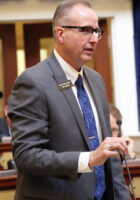In a decision that could have an implication for Idaho schools, the Supreme Court has sided with a Missouri church that sought a share of state funding.
In a 7-2 ruling Monday, the court said the church could tap into a state fund for playground improvements. The high court’s ruling challenges Missouri’s version of the “Blaine Amendment,” which forbids the use of public dollars to support religious programs.
Idaho is one of about three dozen states with a version of the Blaine Amendment in its constitution. The amendment has effectively stifled any talk of using public dollars to support church-owned schools, blunting any talk of establishing school vouchers or education savings accounts.
And Monday’s ruling could change that dynamic.

“This is potentially a big deal for states with Blaine amendments,” said Terry Ryan, CEO of the Idaho Charter School Network and Bluum, a nonprofit group focused on school innovation. “I think it shows that the Supreme Court has an appetite for looking into this further.”
“This is going to encourage people to look at it again,” said Rob Winslow, executive director of the Idaho Association of School Administrators, which opposed a 2016 attempt to chip away at the Blaine Amendment. “It’s not going to go away, this issue.”
State superintendent Sherri Ybarra, meanwhile, was noncommittal about Monday’s ruling — merely pointing out at that Idaho’s Blaine Amendment forbids using public dollars to fund church-owned schools. “As Idaho’s superintendent of public instruction, I am bound by Idaho’s constitution,” Ybarra said in a statement.
The case before the Supreme Court did not address school funding — in Idaho or anywhere.
Instead, the topic at hand was a playground at a church-owned preschool and daycare center in Missouri.
The Trinity Lutheran Church in Columbia, Mo., had hoped to secure a share of state funding to resurface its playground, replacing a pea gravel surface with a rubberized material from recycled tires. The state originally denied the request, prompting the court challenge that culminated Monday.
“The exclusion of Trinity Lutheran from a public benefit for which it is otherwise qualified, solely because it is a church, is odious to our Constitution all the same, and cannot stand,” said Chief Justice John Roberts, writing for the majority.
In her dissent, Justice Sonia Sotomayor said the court ruling led “to a place where separation of church and state is a constitutional slogan, not a constitutional commitment.”
Because of its broader implications for public funding — particularly education funding — the Missouri case captured the attention and the fancy of school choice advocates.
In the wake of Monday’s ruling, the CEO of one school-choice group saw an opening.
“(We) will work to ensure that there will be other opportunities for the court to review the constitutionality of Blaine Amendments and pave the way for parents to decide the best educational opportunities for their children, be they private, religious or public in nature,” said Jeanne Allen of the Washington, D.C.-based Center for Education Reform.
The head of a national teachers’ union read the ruling differently — and downplayed its implications for schools.
“This decision was about providing a generally available benefit to a church that was not going to be used for religious purposes and would not violate the establishment clause of the First Amendment,” said Randi Weingarten of the American Federation of Teachers.
In Idaho, the Blaine Amendment is well-entrenched and politically popular.
The procedural hurdles alone are daunting. It is difficult to amend any constitutional language; a change requires two-thirds support in both houses and voter ratification.
Gov. Butch Otter and House Speaker Scott Bedke have both said they prefer to keep the Blaine Amendment intact. The same goes for the state’s three most prominent education groups: Idaho School Boards Association, the Idaho Education Association and the IASA.
The ISBA said it was “disappointed” by Monday’s ruling.

“ISBA still strongly believes that the use of public funds in regard to education should remain with public schools as currently outlined in Idaho’s constitution,” the group said in a statement.
In 2016, Rep. Ron Nate, R-Rexburg, pushed for changes in the Blaine Amendment — and eventually said the proposal could pave the way for a voucher system. The proposal never made it out of a House committee, and did not resurface in 2017.
However, Monday’s Supreme Court ruling could move Idaho’s debate out of the legislative arena and into the courts.
More reading: Details on Monday’s ruling from the Washington Post and USA Today.
